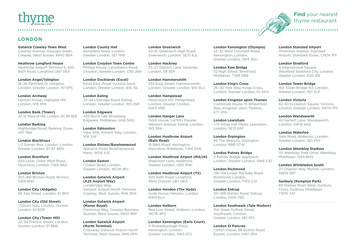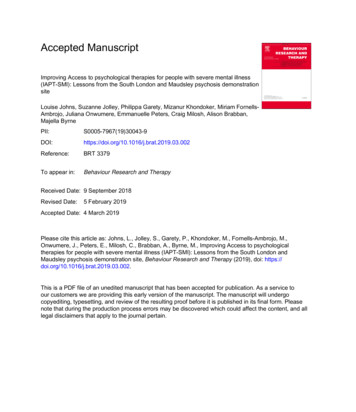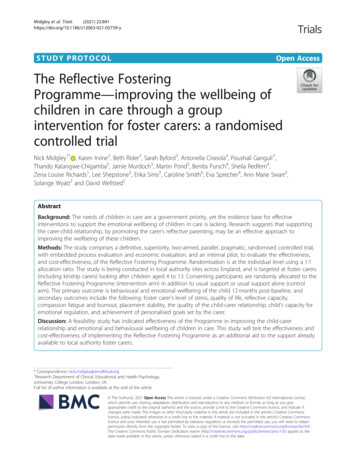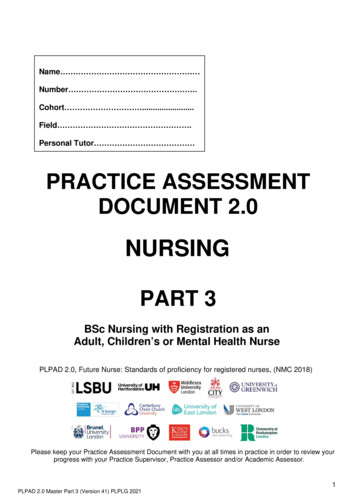
Transcription
Doctorate in Clinical PsychologyCourse NewsletterAutumn 2017Dear Colleagues,Welcome to the Autumn 2017 edition of the UCL Doctorate in Clinical Psychology CourseNewsletter.Firstly, I would like to extend a warm welcome to our new cohort of trainees who will be joining us in the next week or two. I would also like to congratulate our out-going trainees whohave recently completed their Vivas and who are looking forward to their leaving party thisweek. It has been great to see this cohort develop throughout their three years at UCL and Iknow that I speak on behalf of the entire staff team when I wish them all the very best in theirfuture careers as clinical psychologists.As always, the course staff would like to extend our gratitude to all of our regional supervisorswho are involved in supporting trainees with their research or in offering clinical placements.Your continued collaboration with the course ensures that we provide trainees with the highest quality of training.In this edition, Tony Roth (Joint course director) provides an update on the future funding oftraining. We hear about some exciting projects that are currently being carried out by currentand recently qualifying trainees, one that has even attracted the attention of the BBC news.We also hear about an interesting piece of research focussing on the prevalence of autism inthe homeless population. Two trainees also talk about their experience on placement wheretaking leadership role has provided a chance to develop competences outside of their usualclinical practice. We have some updates on the BABCP pathway that has now completed it’sfirst cycle of trainees and direct our readers attention to a new library of CBT training videosthat is available to our trainees. We welcome three new members of staff to the UCL team,and announce the retirement of three key figures at UCL that all of trainees (past and present) as well as supervisors will I’m sure will miss - Sue Watson, Chris Barker and NancyPistrang.I hope that you enjoy reading the selection of articles from different aspects of the course. Weare very proud here at UCL of the great work that our trainees are involved with in the regionalongside their supervisors. If you wish to contribute to future editions of the newsletter orwould like to include an article reporting on any exciting and innovative projects being undertaken in your service by our trainees, please do contact me at jarrod.cabourne@ucl.ac.uk.Warm regards, Jarrod CabourneClinical Tutor/Service User & Carer Committee Lead
Funding of Clinical Psychology training – an interim updateProfessor Tony Roth (Joint course director)Over the past two years there has been some uncertainty about the way in which clinical psychologytraining will be commissioned. This follows decisions made in the Comprehensive Spending Review toremove the nursing bursary, and so create a model whereby training of health professionals is(essentially) self-funded. Largely because we are a small profession the implications for our own training were overlooked, and so we continue to be commissioned by Health Education England (HEE) asin previous years. (We are in the same position as a small number of HEE-commissioned professionswhose training is funded on a similar basis to our own– this includes chid psychotherapy and clinicalscientists).HEE have indicated that for this coming year (for entry to training in 2018) the commissioning arrangements will remain as at present, but beyond that the picture is less clear. It looks likely that HEE willexamine the assumptions behind our training model, and consider the implications of any changes (forexample, on recruitment and diversity of applicants). This is actually quite reasonable, given that weare in a fairly privileged position relative to other professions.Because of the uncertainty there is a lot of scope for rumour to surface as fact, and there have beenseveral panicked – and so unhelpful - exchanges on social media, usually announcing the imminentdemise of training. However, if there were to be a significant change we would be given some noticeof it, so an important take-home message is that unless the source is impeccable, it probably isn’t correct.So what are we doing to argue our case? We have a very good relationship with the branch of HEEthat commissions training in London, and have been assured that when a mechanism for reviewingtraining emerges we will be informed (and so hopefully can be involved directly). At a national level agroup has been convened to pool intelligence and identify strategy so as to be ready to act should significant changes to training be proposed. This group is chaired by Tony Lavender, and includes thechair of DCP, several senior BPS officers and several course leads (and myself).One consequence of this uncertainty is that potential trainees may well be worried about their prospects. For now, they should be reassured, though it is realistic to indicate the possibility of change inthe longer term. One certainty is that anyone on a training scheme will not be affected by any change –their terms and conditions will be honoured.Hopefully this interim update is helpful, even if there is – as yet – no conclusion.
ResearchResearching autism in the homeless populationAuthors: Morag Ryder and Alasdair ChurchardLiving in London, it is impossible to ignorethe widespread and growing issue of homelessness. Those working in homeless outreach teams have suspected that a numberof their long term rough sleeping clients whoare seen as hard to engage may have underlying Autism Spectrum Condition (ASC).This project came about when a proactivecommissioner in homeless services reachedout to UCL to collaborate on a project toexplore this hypothesis further.BackgroundHaving ASC may increase an individual’s risk of becoming homeless due to their smaller social networks and difficulties maintaining relationships. Homeless services are also not well designed to meetthe needs of individuals with ASC, making it difficult for these individuals to exit homelessness. Thereis currently no peer-reviewed research into whether or not this is the case. This study sought to estimate the prevalence of elevated traits of ASC in a group of long-term homeless people and the associated characteristics of this group.MethodThe research was conducted through a homeless outreach service in Greater London. Due to ethicaland methodological considerations, we did not meet directly with homeless individuals. We gatheredanonymised data about the team’s entire caseload (n 106) through interviews and questionnaires withkeyworkers. Elevated autistic traits were determined via keyworker report of clients’ behaviours, usinga semi-structured interview based closely on the DSM-5 diagnostic criteria for ASC. The majority ofthe sample was male, white British and most commonly street homeless. The average age was 50and average length of homelessness was 10 years.
ResearchResultsPrevalence: 12% (n 13) of the overall caseload showed strong evidence of the full range of traitsassociated with ASC. A further 8.5% (n 9) showed possible evidence of traits associated withASC. These 22 individuals (together, the elevated autistic trait group) were compared to the remaining 72 individuals on key characteristics.Characteristics: Based on keyworker reports, the elevated autistic trait group showed a pattern of: reduced drug and alcohol use being completely isolated (i.e. no partner, peer relationships or contact with family) consistently declining offers of statutory accommodation (thus remaining street homeless); and having greater odds of becoming homeless due to being unable to manage to live independently (e.g. following the death of a parent). the prevalence of mental health issues was high and similar across both groups.ImplicationsThe main implication arising out of the research is that staff working in homeless services need tobe offered better training and have an increased awareness of ASC. In addition, services shouldadapt to be more autism friendly.An important part of the project has been disseminating its results. We have met with the NationalAutistic Society, Homeless Link and the Department for Communities and Local Government. Ouraim is to collaborate with these services and service users to develop a briefing document forstaff, setting out guidelines for working with homeless individuals with suspected or diagnosedASC.We were both interested in working on a project where the research question arose from a clinicalneed and where the research would have practical implications. This collaborative research approach worked well and it is something we would encourage more of for future thesis projects.
Developing Leadership competences on placementAs part of developing competences to be an effective clinicalpsychologists, we have seen a move over recent years to trainees taking on more active leadership roles on their clinicalplacements. Here we heart from one of our soon to be qualifiedtrainees, Morag Ryder on her experience of embarking on apurely focused leadership placement as part of her training.Reflections on a leadership placement –“Proceed until apprehended!”I was very excited to be the first trainee to have a six monthleadership placement with Beacon UK. Beacon UK is a managed mental health care company that works in partnership withthe NHS and third sector providers, providing a number of services including access centres. As it is not a service provider,there was to be no direct client contact during my placement.This was very different to my previous placements and so I wasI was primarily based in BeaconUK’s corporate office in the King’sFund, where the team was made upmostly of non-clinicians. I also regularly visited Beacon UK’s contractsin Birmingham and Surrey for children and young people’s mentalhealth. These teams comprised awide range of staff, including IT anddata analysts, nurses, social workers and assistant psychologists. Mysupervisor was a clinical psychologist and the managing director ofthe company.
In some ways, the work was similar to the indirect work I have had on other placements. I providedconsultation to non-psychology colleagues around formulation of complex cases, co-facilitated supervision of assistant psychologists and developed the assistant psychologists’ development programme. I was also involved with triage and audits.The main difference between my time at Beacon UK and my other placements was the exposure Ihad at the level of the seni or leadership team. From week one, I joined all the internal and externalsenior leadership and company board meetings and increasingly was encouraged to contribute tothese. Day-to–day, I was also involved with service design and delivery, including financial modellingand business development, such as bidding for new contracts and mobilising of a new contract. Itwas very interesting to see how things worked at the systems level.The culture at Beacon UK was also quite different to my previous placements. It had the feel of astart-up in the sense that it was non-hierarchical – for instance, I was never called a “trainee” duringthe placement. The atmosphere was fun, dynamic and fast paced - new ideas were embraced andimplemented quickly. It is telling that Beacon UK’s motto is “proceed until apprehended” and thisproactive approach is something I have taken away with me.What helped the most to develop my leadership competencies was having a supervisor who modelled leadership and openly reflected with me on her experience, was interested in my personal development and encouraged reflection on areas such as personality and women in leadership. Shetaught me not to assume that anyone else, including people more senior or more experienced to me,had all the answers. Having a supervisor who took a different path as a clinical psychologist has alsochanged how I think about the role of clinical psychologists and clinical psychology.Clearly, trainees do not need to have a placement outside of the NHS or a specific leadership placement to develop leadership competencies. However, with growing expectations for clinical psychologists to be leaders, courses and placements need to give more opportunities and support to empower trainees to become leaders.Reflecting on my experiences both during and prior to the course reminded me that trainees come tothe course with a range of experiences of leadership and the course could build on this, for exampleby involving trainees in co-delivery of teaching. Having leadership mentors and reflective practicesessions on leadership could be another way for the course to better support trainees to developleadership competencies. My placement highlighted to me that a better grounding in some businessbasics such as how to manage a budget could be beneficial as part of the teaching programme. I amvery grateful to have been given such an opportunity through my placement at Beacon UK. I did notset out on the course thinking of myself as a leader but the placement gave me the confidence that Icould take on a leadership role in the future.
News from the regionDevelopment of a new community network to tackle the effectsof housing problems and austerity measures on mental healthBy Catriona Amberton (current UCL trainee)Between September 2015 and April 2016, a participatory action research project was undertaken inthe London Borough of Newham, examining the experiences of those facing potential or actual homelessness. Its findings reflect extremely high levels of hidden homelessness; serious physical and mental health issues arising or being exacerbated by insecure housing, and an apparently systemic attempt to remove vulnerable people from the borough. This piece of research, authored by Kate Hardyand Tom Gillespie, academics from Manchester and Leeds universities, highlighted the detrimentaleffects of local council’s housing policy on some of its most vulnerable community members.Sally Zlotowitz, Chair of the BPS Community Psychology faction, posted this research on the Community Psychology UK JISC mail site, which led to a group of 8 professionals joining to discuss why theresearch was important to them and how we could bring those with similar views together. This led tothe organisation of an event to launch the Housing, Austerity, and Mental Health Network, which tookplace at Durning Hall Community Centre in Forest Gate, London on the 26 April 2017.The event included a presentation from members of Focus E15, activist residents, who described theirexperiences of collecting data and developing the research paradigm. Kate Hardy and Tom Gillespiewere there to comment and elaborate on the research findings. Following this, Joel Benjamin spokeabout the work of Debt Resistance UK: the connections between Newham council’s borrowing throughLOBO loans and the impact on social housing and homelessness. The event was publicised with anaim of gathering individuals from various backgrounds with a shared interest in tackling these problems. Attendees included local mental health practitioners, senior representatives of clinical psychology and the Citizen’s Advice Bureau, academics, local activists and residents.The event highlighted: The success that Housing activists can achieve That participatory action research is a great way for researchers, academics and practitioners toget involved and support this work and to demonstrate to others how real world events and practices are impacting on people’s mental health. We are stronger together There is a network to join people together to fight this issue - The Housing, Austerity and MentalHealth NetworkFurther details can be found k/ and housingmh@outlook.com
The network provided a response letter to the events at Grenfell Tower, which was published in theEvening Standard, and received over 325 signatures. The letter emphasised the importance of rehousing the victims in their local area and the impact that displacement can have on people’s mental health.Following this, there are plans for an open letter to be written and published with more details about theeffects of cuts and council misspending on the vulnerable residents’ livelihoods.The network has monthly meetings on the first Monday of the month, which are open for anyone to attend who would like to share their ideas on potential projects for the network, to request for the networkto help in a matter, or just to be part of something that they feel is important.Current projects: Members of the network are currently making links with existing networks who work on housingmatters, such as the Radical Housing Network, ACORN (a tenants’ management organisation), Focus E15, Debt Resistance UK, and Architectural workers. Network coordinator Rebecca Amos has recently presented about impact of displacement and howto support residents in unsafe housing blocks. Making links with London based clinical and community psychology trainee networks for contributions and new members Open letter about Grenfell Tower, the effects of displacement on mental health and the importanceof processes including involving the community when discussing local housing policy. Presentation at the next Community Psychology Festival (September 2017)Catriona’s Involvement“I became involved in the network before the launch event, fromhaving conversations with the coordinator Rebecca Amos, whohappened to be working at my placement. We spoke about ourvalues and how we both viewed social change as a key factor intackling mental health problems. Our second-year lecture aboutsocial inequalities really drove this message home to me, and ever since I’ve been passionate about spreading that message andbeing more active in my endeavours to enable change and help insituations where I can.I started by being on hand to facilitate the launch event – promoting discussion after the speeches and gathering contact details from attendees in order to securecommunication with interested parties following the event. Since then, I’ve worked closely to assistcoordination of the network- using my skills in writing to draft and edit emails and communicationsent out by the network, and am an administrator of the Facebook group. I continue to attend meetings and be a key part in spreading the message that housing is incredibly important in improvingthe wellbeing of those most vulnerable in society. I am fortunate enough to be a homeowner at thispoint in my life, but have in the past experienced housing insecurity and the impact that it had onmy own mental health, thus this is a cause close to my heart and I intend to try to make a difference through my involvement.”
From Practice to PolicyDr Nina Browne is a Clinical Psychologist, qualifyingfrom UCL in 2016. Prior to training she had workedfor 10 years in community mental health settings,heavily influenced by Community Psychology. Shebrought these interests into her doctoral training,supporting the organisation of lunchtime and evening talks on such topics and spending her final yearat MAC-UK. Her thesis, with Professor Chris Barker,Dr Kat Alcock and Dr Sally Zlotowitz, is on how psychology can be used to influence policy. As a resultshe has developed a new policy workshop for trainees UCL. Here, Nina talks about her experience ofembarking on a new social enterprise.Just do it!Dr Melinda Rees, Managing Director at Beacon UK, said to me “There’s that saying, if you are offereda seat on a rocket ship, you don’t refuse it. So, I thought this is a huge journey I can go on, it won’t becomfortable, it will be totally exciting, and I’ll learn so much It could all go wrong but you know, if youdon’t try. So I took a risk”I think about her words a lot. I had no idea at the time she was also summing up my first year postqualification. My thesis, ‘From Practice to Policy’, put me in the privileged position of hearing her professional journey, and the journeys of 37 other eminent clinical psychologists. They had all used theirclinical training to influence policy; they all had very similar advice. Firstly, this wasn’t about developing a new set of competencies, as I had set out to do, but instead developing confidence in our existing skills to use them differently. Secondly, we need to become skilled at seeing opportunities to dothis, take risks and then. “just do it” (In the words of Professor Peter Kinderman, not Nike).Therefore, when I was offered an opportunity to board arocket ship, joining Dr Charlie Howard in setting up a newsocial enterprise, I couldn’t ignore the recommendations I’dbeen writing up for the previous year. My first day at workwas in the basement of Costa in Kilburn, our office at thetime, and I remember Charlie saying “I’m not sure exactlywhat we’ll be doing first, but let’s establish our vision”.
Owls’ vision, that we wrote that day, is “a world where anything is possible through collaboration andwhere communities are listened to and looked to for solutions”. In practice we achieve this by workingacross boundaries and use psychology in creative new ways. We partner with people, communities, organisations and policy makers to develop new solutions to mental health.Owls provides me with an opportunity to develop practice-based evidence on how psychologists changepolicy, as well as learning about our role in leadership. For example, how do I communicate complexideas simply? This was put to the test when I presented my thesis at the conference of the Society forCommunity Research and Action (SCRA) in Ottawa. I was asked to do an ‘IGNITE’ presentation of 15slides of images in 5 minutes. I learnt from giving that a go that more people were interested in the ideasfrom that presentation than will probably ever read my thesis.Fast forward a few months and some cardboard boxes I had collected from my local market formed partof a feature on BBC news. The BBC were reporting on Problem Solving Booths (PSB), which at the timewe were launching for Thrive LDN, the Mayor’s city wide movement for mental health in London. Here isa film we made at the first ever PSB, which taught me about film licensing, script writing, governanceand being prepared to fail.PSBs bring members of the community together tohave conversations that they might not usually have,by helping each other with their problems. The ideawas suggested by a young person who, when askedwhat would help with feeling stressed, said “a problemsolving booth right here on my street”. One chair is forthe Helper, the person listening to the problems, andthe other for the Helped, the person describing theirconcerns.The aim of the PSB, however, is that people swap roles regularly as we all have both the potential tohave problems as well as to offer help. We have led the testing and development of this idea in closepartnership with a wide range of partners including Camden Council, Camden and Islington NHS Foundation Trust, the MET Police in Hounslow, South London and Maudsley NHS Foundation Trust,Tavistock and Portman, Goldsmith University and Method.
Another partnership is with the Camerados, a social movement tackling loneliness. My role hasbeen co-developing Public Living Rooms, ensuring their work is underpinned with clinicallysound, evidence-based principles. This has involved co-producing some tools that enable people to have difficult conversations, or how to takecare of themselves afterwards. Ensuring that thecommunities voices are at the centre of how wework, it’s meant talking about loneliness onstreets, buses, beaches and in shopping centres.What’s next? We are always looking for partners, especially as we continue to test and scaleProblem Solving Booths. We have a trainee joining us who will co-develop a new placement; together we will continue to share our learning. Thinking about becoming a supervisor myself reminds me of the all of the supervisors and managers I’ve had that inspired and enabled me towork in different ways for years! It’s significant, that as I write this one of my most influential supervisors is clearing his office at UCL for his retirement. Without Professor Chris Barker, my ownjourney would not be beginning in this way as his comes to an end. So the other thing that I’ll bedoing is trying to convince him to keep running Problem Solving Booths with us! Happy RetirementChris!To find out more:You now can book onto a free problemsolving booth training in-more-detail
Developments in TeachingNew Additions to the CBT Video ResourcesNew video resources are now available in UCL Moodle covering CBT for psychosis (CBTp), CBTwith children and young people, and common difficulties in implementing CBT with less straightforward clients.The CBTp clips, produced in collaboration with the University of Exeter, cover areas specific toCBTp such as having a dialogue with clients about ‘unusual experiences’ and talking with clientsabout command hallucinations. They also demonstrate adaptations for common issues such as responding to clients who feel that the therapist does not believe them.
There is now an extensive library of clips on implementing CBT with children and young people.The videos were designed to show clients with a range of different ages and problems. Key topicareas include: setting the right context for therapy building a therapeutic alliance during assessment collaborative practice structuring the therapeutic process CBT skills aimed a facilitating understanding CBT skills aimed at facilitating coping, acceptance and change setting, monitoring and evaluating progressFinally, three new videos have beenproduced in response to the demand for demonstrations of CBTskills applied to less straightforwardclients. These are designed to complement the existing tutorialsdemonstrating basic competencies.The emphasis is on common issuesthat therapists can struggle withwhere client presentations includerelationship issues that may affectthe therapeutic alliance.The topics are: Balancing session structure and the therapeutic alliance in the face of heightened emotion Balancing attention to task and process when implementing a therapy technique that may trigger a client’s NATs/distress Maintaining collaboration when developing a behavioural experimentThe videos highlight some key areas of good practice and demonstrate both competent and lesscompetent ways of dealing with the same issue.All video resources are available via the UCL Moodle website in the Learning Resources section.Supervisors and trainees may find it helpful to watch these together to facilitate learning and reflection on clinical skills.
Update on the BABCP PathwayThe course is now in its second year of the BABCP accredited CBT pathway. Just under half of theincoming trainees are about to embark upon the pathway. Trainees on the pathway have a significant number of additional academic and clinical requirements, with the clinical work needing to besupervised by supervisors accredited with the BABCP. Full details of the pathway are on the dedicated webpage: www.ucl.ac.uk/dclinpsy/babcp .Our congratulations go to Deirdre Noone and Radha Kothari, who are the first UCL trainees to complete the CBT pathway alongside their DClinPsy this September, and a big thank you to their dedicated supervisors.We are very grateful to all the supervisors who have helped to make the new pathway a success –we could not have done it without you. We are also conscious of the supervisory demands of thepathway, and for the coming year we are introducing new CBT pathway supervision groups whichwill be facilitated by Dr Sue Watson. Where needed, and on the basis that it fits with other placement commitments, first year trainees on the pathway will be able to attend one of these groups forthe first or second half of their first year, and they will receive supervision on up to two of their exemplar cases. We will be writing to supervisors shortly with more details.Together with Royal Holloway, who are also introducing a similar CBT pathway this year, we willagain be running a BABCP supervisor workshop on 1 st December 2017, so please do book on tothis if you have not already attended the workshop and you are supervising a pathway trainee. Thisis in addition to the CBT supervision workshop run by all three of the North Thames courses. Detailsof both of these workshops and how to book are available at: http://www.ucl.ac.uk/dclinpsy/eventsWe always welcome feedback from supervisors about the pathway, so please do get in touch withme if you have any feedback or would like to discuss anything.Dr Henry ClementsSenior Clinical Tutor and CBT Pathway Leadhenry.clements@ucl.ac.uk
Update on the BABCP PathwayA trainee’s experience of the UCL CBT pathwayMauricio Alvarez Monjarás is once of our 2016 cohort trainees, who has recently completed his firstyear of training and is on the BABCP pathway. Here he tells us a little of his experience of his firstyear on training whilst embarking on the pathway.“When I started the UCL Doctorate in ClinicalPsychology I was excited to be given the opportunity to undertake the BABCP-accreditedCBT pathway. Although the requirements forthe pathway are demanding, following thepathway has been extremely useful for developing my clinical skills and knowledge. Theamount of clinical hours, alongside the in-depthand thoughtful supervision, has helped me gaina clear understanding of CBT theory and practice, and has provided a well defined structurefor formulating and working effectively with clients. Also, being placed in a personality disorders service has given me the opportunity to develop skills in third-wave approaches (particularly DBT) andto apply these skills to complex cases within an SMI setting. It has certainly been daunting, especially coming from a more psychodynamic background at home; however, as my first
Doctorate in Clinical Psychology Course Newsletter Dear Colleagues, Welcome to the Autumn 2017 edition of the UCL Doctorate in Clinical Psychology Course Newsletter. Firstly, I would like to extend a warm welcome to our new cohort of trainees who will be join-ing us in the next week or two. I would also like to congratulate our out-going .










